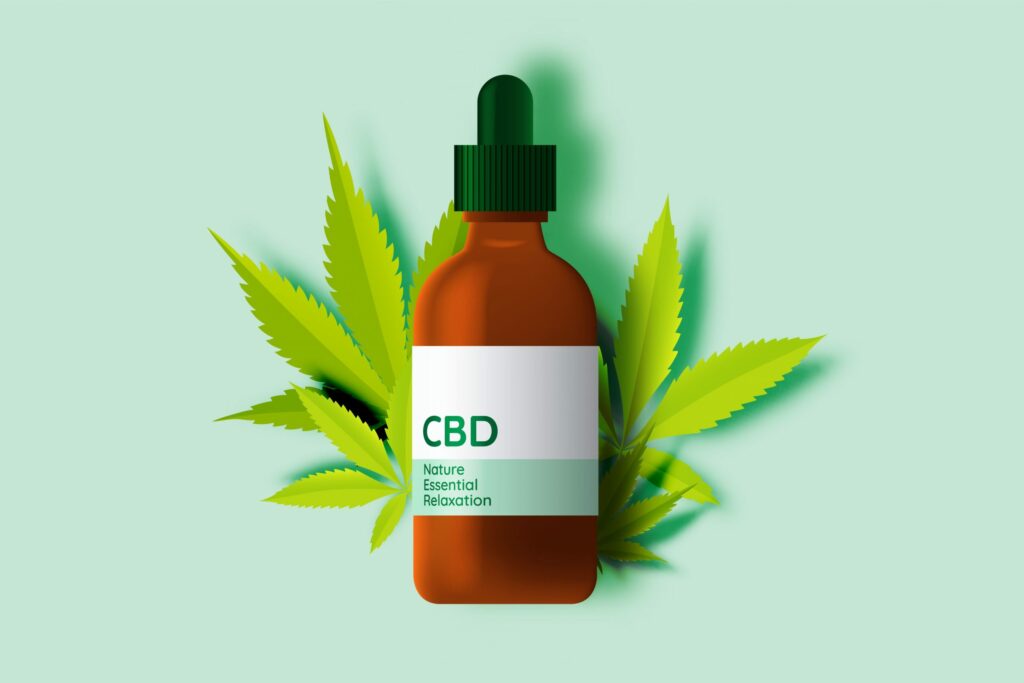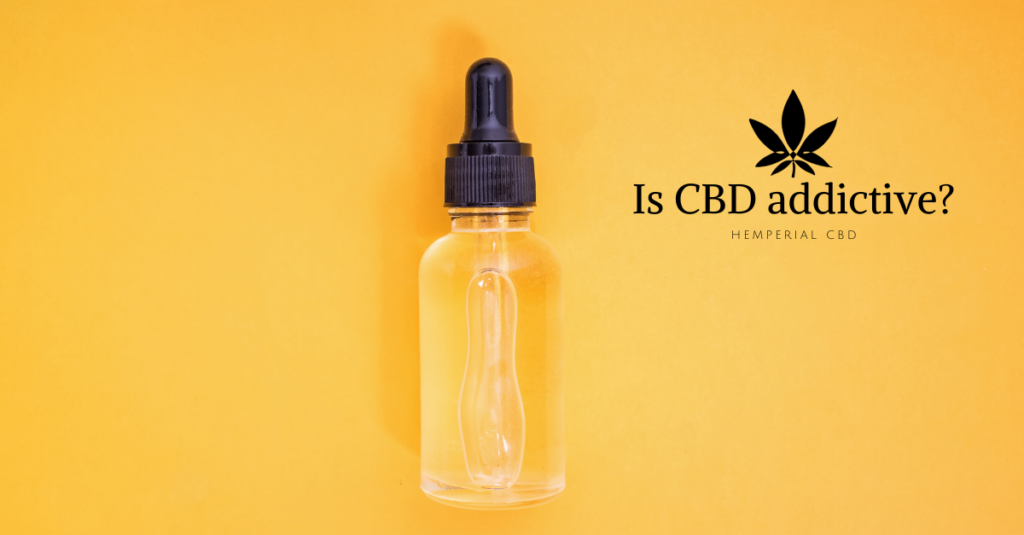A increasing amount of studies emphasizes CBD’s health advantages but is CBD addictive? Studies have demonstrated that CBD can lower anxiety and help people cope with their daily stresses in addition to having anti-inflammatory and seizure-suppressing effects.
A worldwide cannabis revolution has recently begun as a result of the recent explosion in CBD’s popularity, which has spread to every country on earth. All 50 states permit the use of CBD oil made from hemp as long as the THC content does not exceed 0.3%.
Even at levels as high as 1,500 mg per day, CBD is a safe and well-tolerated substance, according to the WHO.
What about CBD addiction?
Despite the myriad advantages of CBD oil, is it possible to get dependent on it?
You’ll receive a comprehensive response to these queries in this article. We’ll discuss the causes of addiction, briefly discuss the effects of CBD on the brain, and highlight how CBD may be able to lessen the symptoms of withdrawal in people who are dependent.
What Causes Addiction?
A complicated physiological and psychological reaction to outside stimuli is what is known as addiction. Researchers have connected addiction to alterations in brain structure and function. Three states can initiate the addictive process, according to psychologists and addiction specialists.
We briefly go over them below:
Pleasure Instigates
The brain is inundated with neurotransmitters like dopamine when exposed to drugs like nicotine, caffeine, or a stimulant like cocaine, which can cause a surge of happy feelings. Dopamine builds up in the nucleus accumbens, a part of the hypothalamus that is crucial to addiction, as a result of the fast inflow of dopamine. The speed, consistency, and strength of dopamine accumulation, according to research, are three factors that affect how likely it is that a person may become addicted. Dopamine response can be influenced by the method of administration, like smoking, taking tablets, or injecting a
Acquired habits
According to scientists researching addiction, pleasure seeking is not the only component that influences addiction. Numerous specialists contend that the issue is far more complex and may actually result from a set of learned behaviors that lead users to seek out addictive substances repeatedly. Dopamine can help to create and amplify pleasurable experiences, but the activity that preceded its release is far more crucial. The basic mechanism underlying addiction, according to the majority of hypotheses, is a reward-related learning process. Dopamine and glutamate, two additional important neurotransmitters, collaborate in this process to help the brain link enjoyable feelings with the behavior that causes them.
Extended Contact with Some Substances
The prefrontal cortex and nucleus accumbens nerve cells can eventually become dependent on activation from some active drugs if you use them on a regular basis. The addictive chemical is subsequently sought for more frequently, which leads to a less potent euphoric experience. In other words, you develop a tolerance to some chemicals. Drug tolerance can be fatal, particularly when it comes to substances like opioids where there is a high chance of fatal overdose.
Severe withdrawal symptoms may be experienced by users who attempt to quit cold turkey. Withdrawals can cause headaches, tremors, discomfort in the muscles and bones, nausea, vomiting, and irritability, depending on the substance.
How Does CBD Work and What is It?
One of the two main components of cannabis is CBD, often known as cannabidiol. CBD doesn’t have psychoactive qualities like the other molecule, THC, therefore it won’t get you high like THC does. By reducing THC’s mental euphoria, CBD may counteract its psychoactive effects.
The primary regulatory mechanism in all animals, the endocannabinoid system, is where CBD interacts with key receptors. These receptors communicate with the rest of the body, giving signs that the brain can decipher. These signals are crucial to how your brain works because they enable it to control vital bodily functions and preserve homeostasis, which is a fancy phrase for biochemical equilibrium.
CBD may promote homeostasis in a variety of ways. More than 65 molecular targets are thought to be CBD’s primary targets, which would account for the wide range of uses and advantages. Serotonin-sensitive 5-HT1A receptors may be impacted by CBD’s interaction with the endocannabinoid system.
Serotonin plays a significant role in mood regulation and can heighten positive emotions like happiness and relaxation. Natural 5-HT1A receptor inhibitors include CBD. Higher amounts of the neurotransmitter can circulate in the body because it is prevented from being reabsorbed in the brain.
CBD interacts with TRPV1 receptors by binding to their sites and suppressing pain-related signals using a similar manner. The nuclear receptor PPAR-gamma, which controls how fats are stored and how much glucose is metabolized, may also be impacted by CBD.
The interactions mentioned above are promise for treating addiction and withdrawal symptoms, but let’s first address the question in the heading.
Is CBD Oil Addictive? – CBD and Addiction

Scientists believe that the potential for abuse of CBD is quite low because it doesn’t result in the same euphoric high as THC. In a 2017 study published in the Journal of Drug and Alcohol Dependence, researchers examined the outcomes of an earlier trial in which they gave regular marijuana users various amounts of oral CBD. The experimenters consumed CBD both by itself and in conjunction with marijuana smoke. The study’s findings were that CBD is just as likely to be abused as a placebo.
An prior study from 2011 found that CBD is less dangerous than THC and other cannabinoids. Researchers discovered that even at high doses of up to 1,500 mg per day, CBD is well tolerated in people. Contrary to THC, CBD did not alter blood pressure, body temperature, or heart rate, nor did it affect psychological or motor skills.
It’s interesting to note that not even THC may cause physical addiction. Experts on addiction claim that 91% of marijuana users never develop a THC addiction. The remaining 9% will simply develop bad behaviors surrounding the material, which could eventually result in abuse.
It’s critical to understand the distinctions between the two sources of CBD extracts: hemp and marijuana, as THC has the potential to be addictive.
CBD from Hemp versus CBD from Marijuana
Cannabis and hemp both yield CBD that can be extracted. Despite having the same genetic parent, Cannabis sativa L., these plants differ in their chemical composition and THC/CBD ratios.
Marijuana has a high THC content by nature, therefore CBD oils made from marijuana strains — even ones with high CBD content — will also have a large THC content. These goods can give users a high.
However, as hemp plants nearly entirely lack THC, CBD oil derived from them won’t result in any intoxicating effects. Hemp plants often have less than 0.3% THC and higher quantities of CBD.
The hemp plant’s CBD has no addictive properties. It is also freely accessible online and over-the-counter in well-known pharmacies, dispensaries, vape shops, and smoke shops because it is legally authorized.
At Hemperial CBD, we exclusively produce hemp-based extracts that have undergone testing and certification by an independent laboratory, ensuring that they are consistent with federal law and have a THC content of less than 0.3%.
Studies suggest that CBD may be able to combat addiction.
In a thorough analysis on CBD that the World Health Organization published in 2017, they recognized its safety and said there was little chance of abuse.
We indicated earlier in the essay that CBD could be used to lessen the effects of addiction and withdrawal.
Researchers used CBD to treat a 19-year-old woman with cannabis withdrawal symptoms for 10 days in a 2013 study. They observed a significant reduction in the severity of her symptoms after that. An earlier study from 2010 that was published in the journal Neuropsychopharmacology put 94 cannabis users to the test to determine how CBD-to-THC ratios affected the effects of psychoactive substances and attentional bias to drug cues. The study discovered that participants who smoked high-CBD strains displayed lower attentional bias to food and drug cues as well as lower self-rated reliance on cannabis when compared to users of high-THC strains. The researchers came to the conclusion that CBD could be used to treat addiction to cannabis as well as other addictive illnesses.
Additionally, CBD may lessen addiction to other substances like cigarettes or opioids. A 2013 study that was published in Addictive Behaviors found that giving addicted participants CBD for a week reduced their cigarette consumption by 40%, compared to the placebo group, which had no discernible effect.
Studies using animal models also support the ability of CBD to reduce the usage of other addictive drugs. Researchers gave CBD gel to lab rats in a 2018 preclinical animal study that was published in Neuropsychopharmacology. The lab rats displayed addiction-like behavior toward alcohol or cocaine following voluntary usage. The study team discovered that CBD was effective at lowering rodent drug usage and at reducing the negative consequences of addiction, such as anxiety and impulsivity.
Reverting to human examples, a 2019 study indicated that CBD may help persons with cravings related to heroin addiction. It was published in the American Journal of Psychiatry. 42 adults who had been heroin users for an average of 13 years were the subject of the study. The individuals were sorted into three groups by the researchers.
Different CBD doses were given to two groups. A placebo was given to the third group:
- 800 mg CBD
- 400 mg CBD
- Placebo
Those who took CBD experienced much less anxiety and cravings associated with heroin withdrawals when compared to those who took a placebo.
What Negative Effects Does CBD Oil Have? Can CBD Lead to Overdose?
A well-established safety profile exists for CBD. When you consume too much CBD oil at once, a few minor negative effects could happen.
CBD side effects that could occur include:
- Dry mouth
- Lower blood pressure
- Changes in appetite
- Dizziness
- Sedation
- Diarrhea
The brain stem region that regulates breathing is unaffected by CBD, thus you cannot overdose on it.
We also feel compelled to discuss one more significant topic.
CBD and Drug Interactions: Consult Your Physician
Cytochrome p450 is a mechanism that may be affected when you consume CBD. The bulk of active components in pharmacological drugs are metabolized by this system. Cytochrome p450 is inhibited by CBD, which stops the liver from processing these substances.
This method is comparable to the way grapefruit might impact your metabolism when taken with medicine.
A range of indirect adverse effects that aren’t brought on by CBD itself may result from the interactions between CBD and medications. They might also have a negative effect on how well your treatment works. If you currently take any prescription medications and are concerned that CBD might interfere with them, we advise you to speak with your doctor.
For a complete list of compounds that are processed by Cytochrome 450, read our article on CBD-drug interactions.
Summary of CBD and Addiction
Addiction is a disease of the brain. Intense desires for a certain substance appear as its primary symptom despite the negative effects. People with addiction issues exhibit a variety of symptoms, including poor cognition, abnormal physiological processes, and behaviors that may jeopardize their daily life.
Early research has not discovered a connection between CBD and modifications in perception, judgment, or cognition. Without experiencing a “high,” the brain might not link the chemical to reward areas. Additionally, there are no withdrawal symptoms or deadly doses of CBD.
It’s interesting to note that recent research has found that CBD may be effective in reducing addiction to a variety of substances, such as alcohol, nicotine, opiates, and heroin. In addition to helping with physiological addiction, CBD may also be able to assist people break unhealthy habits they may have developed around various substances and pastimes.
Overall, it appears that CBD may be effective against addiction in a variety of contexts.
